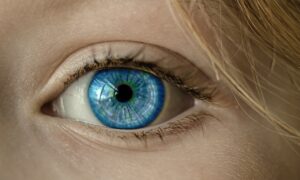Why Eye Scan Technology can't compete with Polygraph
THE TRUTH ABOUT EYE SCAN LIE DETECTOR TECHNOLOGY
EyeDetect promotes its technology as a non-invasive lie detector, with no physical attachments required, relying on changes within the eye during the automated question sequence. The Examinee rests their chin on a support and faces the camera during the procedure. The entire exam takes 15 to 30 minutes, and the manufacturer boasts an 86 to 88 percent accuracy.
However, here are some issues we have with this technology.

1. EYEDETECT HAS DOUBLE THE ERROR RATE OF POLYGRAPH
EyeDetect cites a 86 to 88 percent accuracy, while a single-issue polygraph cites a 93 to 95 percent accuracy. Those figures translate to an error rate of 12 to 14 percent for EyeDetect and 5 to 7 percent for polygraph. Based on these numbers, EyeDetect has TWICE THE ERROR RATE of polygraph.
2. THE EYEDETECT “EXAMINER” DOES NOT SCORE THE TEST
The proprietary software for EyeDetect requires the “Examiner” to submit the data through the EyeDetect website for evaluation. The “Examiner” is not involved in the interpretation of the data or how the results are calculated. A human should be involved in the process to identify and eliminate anomalous data.
3. CLIENTS GET MORE INFORMATION FROM A POLYGRAPH EXAM
The EyeDetect process does not involve an interview. Polygraph involves an extensive pretest interview which can last an hour or longer, during which time a great deal of information is collected from the person being tested. Definitions are created and agreed upon for ambiguous exam terms, if necessary. Examinees have an opportunity to discuss the test issues with a polygraph examiner, where with EyeDetect they do not have the opportunity for explanation. Admissions are often made during the polygraph interview that would not be achieved with EyeDetect. The ultimate goal of a polygraph exam is “information gain” which requires a certain degree of human interaction to be successful.
4. INCREASED RISK OF INCONCLUSIVE RESULTS
EyeDetect advertise that, when used in combination with polygraph, it can achieve a 97 to 99 percent accuracy. However, that is only true when both tests agree. When the two tests disagree, both test results are nullified. The client has now spent extra money to have two different tests done, with a significant increase that there will be an inconclusive result (whenever the tests don’t agree).
5. POLYGRAPH ANALYZES MORE EFFECTORS THAN EYEDETECT
As noted on their website, EyeDetect relies on “cognitive effort” to determine whether a person is being deceptive, operating on the current research that says being truthful requires less “mental processing” than lying. Cognitive Effort is one of the same effectors that polygraph relies on, just using different technology. However, polygraph testing relies on more effectors than just one… fear of detection, cognitive effort, and cognitive dissonance. In other words, EyeDetect is measuring the same effector that polygraph is already measuring.
6. A FEW HOURS OF TRAINING VS. MONTHS OR YEARS OF TRAINING
EyeDetect requires just a few hours of training. Polygraph requires months of training, often followed by an internship lasting a year or more, involving an indepth study of physiology, psychology, instrumentation, validated scoring methods, and countermeasures detection. Polygraph Examiners are trained and skilled professionals, while EyeDetect “Examiners” are merely technicians who aren’t permitted (or able) to evaluate their own test results.
CONCLUSION
Other than a shorter exam duration, there are no benefits to using Eye Scan technology over Polygraph, so why not make polygraph the “go to” technology out of the gate, and get half the error rate? If the time comes that ocular scanning can be added to the current polygraph measurements, it might be a worthwhile consideration. Currently, we don’t support the use of eye scan technology as a stand-alone lie detection method.
This page addresses the following:
- Eye Scan Lie Detector
- Eye Scan Polygraph
- EyeDetect
- EyeDetect Lie Detector
- EyeDetect Polygraph
- Eye Lie Detector
- Eye Polygraph
- Converus.com
- Converus

